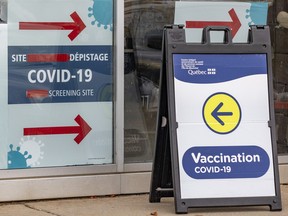Vaccine manufacturers racing to develop COVID-19 shots to guard against the dominant KP.3 sub-variant.

The province reported a total of 671 hospitalizations with and for COVID-19 as of July 5. That’s up from a low of 400 such hospitalizations on April 20 in Quebec. The number of patients in emergency rooms testing positive for SARS-CoV-2 is also rising, according to the Institut national de santé publique du Québec (INSPQ).

More and more Quebecers are testing positive for COVID-19, with the percentage rising to 12.9 per cent as of June 30, according to the INSPQ. That this is occurring during summer suggests that SARS-CoV-2 is still far from a seasonal virus like the flu, a view supported by doctors and experts in the field.
“COVID is not over,” Dr. Susan Kuo, a British Columbia family physician, told the CBC on Friday. “This is the summer. It’s July. It’s not usually a time that we’re seeing so many people that are sick. What this tells us is that COVID is not a seasonal virus.”
A Quebec health-care manager, who agreed to be interviewed by The Gazette on condition that they not be identified so they could speak candidly about the issue, said the latest uptick in COVID-19 infections is not overwhelming hospitals, as past waves had. But the province’s health-care system is still fragile because of a shortage of medical personnel, especially nurses, many of whom are now on vacation.

Despite the ever-present ubiquity of SARS-CoV-2, it is killing far fewer Quebecers than ever. In the first year of the pandemic, COVID-19 claimed the lives of 7,883 people in Quebec. So far this year, it’s been responsible for the deaths of 518 people, still a relatively high number.

The uptick in COVID-19 cases and hospitalizations is being driven largely by the KP.3 sub-variant, which is now predominant in Quebec. KP.3 belongs to a family of super contagious variants dubbed FLiRT, after the locations of their spike protein mutations. In a sign of how fast the wily SARs-CoV-2 can still mutate, U.S. vaccine manufacturers had initially planned a fall booster against an earlier sub-variant, JN.1, but are now working on a shot to protect against the KP.2 strain, “if feasible.”
South of the border, the Food and Drug Agency “does not anticipate that a change to KP.2 will delay the availability of the vaccines for the United States.”
In contrast, Canada’s National Advisory Committee on Immunization released guidance in May on the use of COVID-19 vaccines this fall for high-risk groups that did not allude to KP.2 or KP.3, but it’s likely that it will in its next update. Meanwhile, Novovax is developing a vaccine that would protect against KP.3 in Canada.
“Novavax is working closely with Health Canada to have an updated protein-based COVID-19 vaccine option approved for all eligible Canadians this fall,” John C. Jacobs, chief executive officer of the company, said in a statement last week. “Our updated COVID-19 vaccine is active against JN.1, KP.2 and KP.3, in addition to other JN.1 sub-lineage strains.”
Thus, it behooves all Quebecers to continue to take precautions as authorities have largely stopped talking about improving air ventilation in buildings, which would greatly reduce the spread indoors of SARS-Cov-2 and other respiratory viruses.